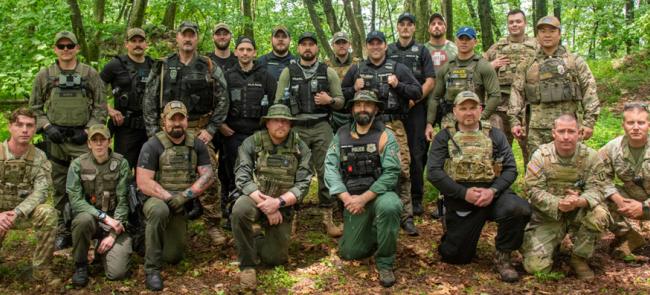
New Voices
By John Goheen, Mark Hensch and Donald Lambert
The largest NGAUS conference attendance in six years may have heard from the widest array of speakers in the event’s history.
Held at Detroit's Huntington Place convention center in August, the 146th General Conference & Exhibition featured two governors, two federal lawmakers, two service chiefs, the president, a former president, America’s most successful veteran entrepreneur and a communications expert who helps military leaders craft tighter messages.
The mix was by design. Retired Maj. Gen. Francis M. McGinn, in his first year as NGAUS president, wants to give conference attendees more than just Pentagon perspectives.
“There are people out there with very inspirational or enlightening messages for National Guard officers,” McGinn says. “More voices. Different voices. This year was just the start. And the feedback we received suggest our attendees like the direction.”
Bob Parsons, who grew up poor and aimless on the streets of Baltimore until he enlisted in the Marine Corps in 1968, provided an inspirational message during the First Business/Professional Development Session on Aug. 24. Today, he is a successful businessman worth $3.6 billion, according to the Forbes list of the world’s billionaires.
Parsons is the founder of Parsons Technology and Jomax Technologies, later renamed GoDaddy, both of which he sold at a significant profit. His focus now is Parsons Xtreme Golf, which makes high-performance golf equipment and apparel. He also owns commercial real estate, motorcycle dealerships, a production company and the Scottsdale National Golf Club in Arizona.
“Everything I have ever accomplished I owe to the Marine Corps,” Parsons said in an on-stage conversation with retired Brig. Gen. Mike Oster, the retired/separated Army rep on the NGAUS board. “They taught me the importance of discipline. They taught me that I could accomplish far more than I ever dreamed that I could and that I had a right to be proud.”
He did not have an easy time in the Marines. Parsons was wounded in Vietnam and spent two months at a naval hospital recovering from his physical wounds. The invisible wounds took longer— not just those from the battlefield, but also those from his childhood.
But Parsons combined what he learned in uniform with big dreams and found a way forward. After graduating college on the GI Bill, he started Parsons Technology, investing $15,000 before the business took off three years later.
“When you screw up in business, what you learn is what you shouldn’t do,” Parsons said. “That’s as important as learning what you should do.”
He recently released his life story in his first book, Fire in the Hole! The Untold Story of My Traumatic Life and Explosive Success. It quickly reached the New York Times Best Sellers List. He signed books for attendees at the NGAUS conference’s Minuteman Stage after his remarks.
“Never expect life to be fair,” he said. “You make your own fairness. We’re not here for a long time. We’re here for a good time.
Communications expert Joe McCormack, who works with multiple military commands, provided the enlightening address McGinn sought. The association president became acquainted with him during the general’s assignment at the Defense Intelligence Agency in Washington, D.C.
McCormack wrote Brief: Make a Big Impact by Saying Less, which was on the Chairman of the Joint Chief’s Professional Reading list in January. Clear, concise communications can help service members complete their missions.
“If you put the bottom line at the bottom, you’re going to lose,” he told attendees during the Second Business/Professional Development Session on Aug. 25. “Speak in headlines. The point of my presentation today is that brevity is your weapon. It is your weapon to cut through the clutter and noise of your day.”
McCormack cited losing an audience, injury and mission failure as some of the consequences from unclear communications in the military. Increased efficiency, strengthening one’s reputation and time savings are brevity’s rewards, he said.
While he never served in uniform, McCormack knows the military well. He spent many years working with Army Special Operations Command at Fort Liberty (formerly Fort Bragg), North Carolina. In 2013, he established the Brief Lab — a business development service aimed at elite communications standards for military and corporate leaders.
McCormack also signed books and spoke to company-grade officers during one of their professional development sessions at conference.
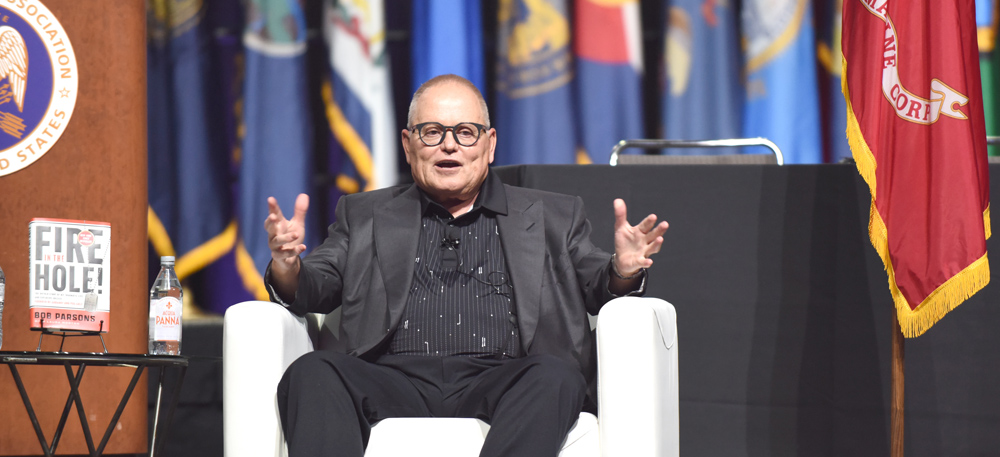
Never expect life to be fair. You make your own fairness.
—Bob Parsons, America's Most Successful Veteran Entrepreneur
THE SPEAKER WHO CREATED THE MOST BUZZ — and the most headlines — was former President Donald Trump, the Republican candidate for president, who addressed the Third Business/Professional Development Session.
“I’ve had no greater honor in life than serving as your commander in chief,” Trump told attendees this year. “You are always ready and always there for us. You were always there for me. I’m always going to be there for you.”
Specifically, he promised to create a Space National Guard under the Space Force, which Trump pushed to establish in 2019.
“Now that Space Force is up and running, I agree with your leadership the time has come to create a Space National Guard as the combat reserve of the Space Force,” Trump said. “As president, I will sign historic legislation creating a Space National Guard.”
The pledge runs counter to the current wishes of Air Force leadership, which is pushing Congress for permission to move Air Guard space professionals to the Space Force without the legally required consent of the affected governors.
Trump’s presence drew the ire of some NGAUS members, as did his bringing former Rep. Tulsi Gabbard, D-Hawaii, to the podium to endorse him. About 20 members called or emailed the association headquarters with complaints. NGAUS officials were not aware that the former president planned to bring Gabbard on stage.
Gabbard is no stranger to the association. A four-term House member (2013-2020) and former Hawaii Army Guard officer, she spoke to the NGAUS conference in 2014 (Honolulu), 2016 (Baltimore) and 2017 (Louisville, Kentucky). She has since transferred to the Army Reserve. She left the Democratic Party after unsuccessfully running for its 2020 nomination for president.
This was not Trump’s first speech to NGAUS. He addressed the association’s 2016 conference. Although invited, he was unable to address the 2020 NGAUS virtual conference broadcast from Washington, D.C., during the COVID-19 pandemic. Then former-Vice President Joe Biden did speak, which drew the ire of some association members.
NGAUS invites and actively pursues both major-party nominees for the White House to speak at the conference in presidential election years. It has hosted at least one candidate during every election year since 1992.
Vice President Kamala Harris, the Democratic nominee in 2024, sent regrets a few days before the conference, but Biden unexpectedly sent a video.
“The National Guard was built to defend America, and you’ve done that,” the president said, echoing the conference theme. “You have my word — my administration will always defend you.”
Other elected officials also addressed the conference, including Michigan Gov. Gretchen Whitmer and U.S. Virgin Islands Gov. Albert Bryan Jr., both Democrats; Rep. John James, R-Mich.; and Sen. Gary Peters, D-Mich.
Whitmer received the Harry S. Truman Award, the association’s highest honor, during the Opening Ceremony. She was recognized for “fighting for service member benefits while ensuring the Guard has modern equipment and facilities to prepare for future conflicts.”
She was also instrumental in securing more than $2 million in state funding to support the conference and the Enlisted Association of the National Guard of the United States conference, which was also held in Detroit in August.
“I’m really humbled to receive this award,” said Whitmer, a member of the Council of Governors, a 10-member body that advises federal homeland and national security officials on Guard matters. “I will keep working to enhance defense and security of the United States and continue to make a difference in the lives of our service members, veterans and their families.”
Bryan received the NGAUS Charles Dick Medal of Merit during the Second Business/Professional Development Session for his role as commander in chief of the Virgin Islands Guard.
James addressed the readiness challenges facing the Guard — particularly the Michigan Guard — during his remarks during the First Business/Professional Development Session.
The freshman lawmaker said the Michigan Guard is often asked “to do more with less” in terms of deployments. “We wonder why retention is such a struggle when burnout and lack of pay parity is the reality for so many Guardsmen,” he added.
James, a West Point graduate, served eight years in the active duty. He was an AH-64 Apache attack helicopter pilot who saw action in Iraq. “You are boots on the ground,” he said. “You deserve all the accolades and every bit of support from Congress.”
Peters — a member of the Senate Armed Services Committee — acknowledged that Congress must continue supporting the Guard in his remarks during the Second Business/Professional Development Session.
One example is the resources to maintain all 25 of the Air Guard’s 25 fighter squadrons. “All of them deserve upgraded fighters, and we are going to keep fighting for that,” he said. “You have my commitment that all of you will have the state-of-the-art equipment you need to do your job.”
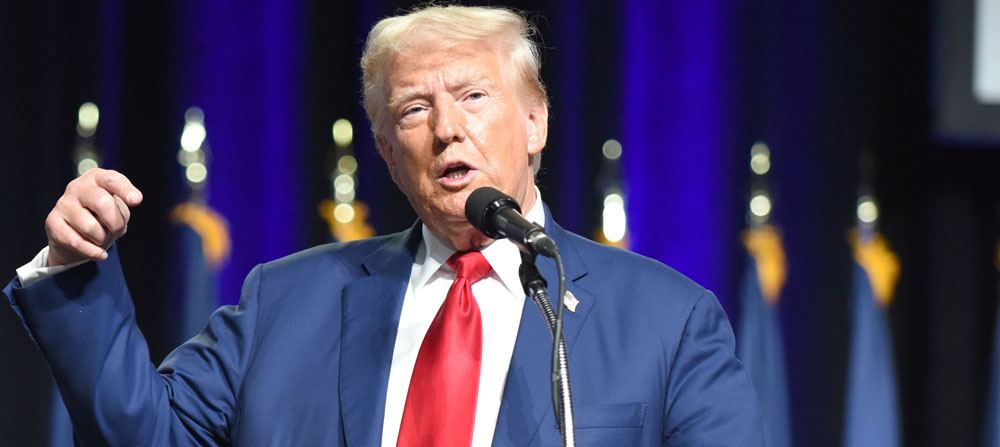
The time has come to create a Space National Guard as the combat reserve of the Space Force.
—Former President Donald Trump
ATTENDEES ALSO HEARD FROM MULTIPLE SENIOR Pentagon leaders, including the Army and Air chiefs of staff and the then-acting National Guard Bureau chief. A volatile world on the brink of a major conflict was a consistent theme.
Gen. Randy A. George, the Army senior officer, laid out two of his biggest concerns in an address to the First Business/Professional Development Session. One is current world events, citing tensions in Eastern Europe, the Middle East and the South China Sea. “It is something I haven’t seen in my time in uniform,” he said.
Rapidly advancing technology is the other, George said. This includes the proliferation of unmanned aerial systems and artificial intelligence, which are changing the “character of war.” It creates “a real sense of urgency” to make sure our entire Army is adapting to those challenges, he said.
“We don’t need to be frantic,” George cautioned. “We have great people. We have everything we need. We just need to start moving out on this.”
Also urgent is a continued focus on readiness at all levels of the force, he said.
“Given the world we are talking about, from my perspective, what America expects us to do is be as ready as we possibly can be,” George said. “That means being completely focused on building lethal and cohesive teams.
“And I’m asking everybody to prioritize what you do,” he added. “It takes a lot of time to build lethality. It takes time to build a cohesive team. The real question is, what are we doing that doesn’t contribute to those two things? That conversation should be happening at training meetings at the company, battalion and brigade level and quarterly training briefs. We have to make really hard choices.”
George cited an Iowa Guard unit he saw during a recent visit to Camp Ripley, Minnesota, as one that has the right priorities.
“They were on AT,” he shared. “They said they knew they had a limited amount of time, so they rolled right into the field after arriving and were immediately getting after their most important things. I applaud that. That’s an example of commanders and command sergeant majors who are really focused on the important things.”
Gen. David W. Allvin, the Air Force chief of staff, also talked about how today’s world is forcing “a lot of change,” perhaps in an era of continuing change.
“We now have peer threats that can challenge our way of life in a way not many of us have seen in our careers,” he said during the Second Business/Professional Development Session. “We need to rethink some of our old value propositions. Maybe instead of being ‘built to last,’ it is built to adapt.”
The changes need to come quick, Allvin stressed.
“We are out of time,” he said during the Second Business/Professional Development Session. “Our actions or inactions will ripple into the future. The end state is one Air Force — one Total Force,” adding that the Air Guard would be one of its cornerstones.
“Nobody knows better than this crowd that throughout time you have to adapt,” Allvin argued. “Our secret weapon are our Total Force airmen.”
Lt. Gen. Jonathan Stubbs, the then-acting NGB chief who spoke during the First Business/Professional Development Session, is a testament to the need to be able to adapt.
When Gen. Daniel R. Hokanson retired Aug. 1, he relinquished his role as the 29th NGB chief and a member of the Joint Chiefs of Staff without a Senate-confirmed successor.
Enter Stubbs. “I did not plan to be up here today,” he told conference attendees. “I had every intention of being down in the audience with you … to hear from the 30th chief of the National Guard Bureau and the direction of the next four years.”
In July, Stubbs was in Little Rock, Arkansas, serving as the adjutant general of Arkansas. He was confirmed by the Senate to serve as Army Guard director July 31. Five days later, he was propelled into the acting-chief role to helm the Guard Bureau during its transition between four-star leaders.
“The fact that I’m up here, facing the wrong way in the room, is a testament to the fact you can’t always count on things going as planned,” he said. “You have to be ready to take on any challenge, ready to look at the big picture and ready to speak your truth and show people who you are.”
Air Force Lt. Gen. Steven S. Nordhaus has since been confirmed by the Senate for the position of NGB chief and received a fourth star. He received his promotion and assumed his new duties Oct. 2. One of his first official acts was to name Stubbs as the acting NGB vice chief.
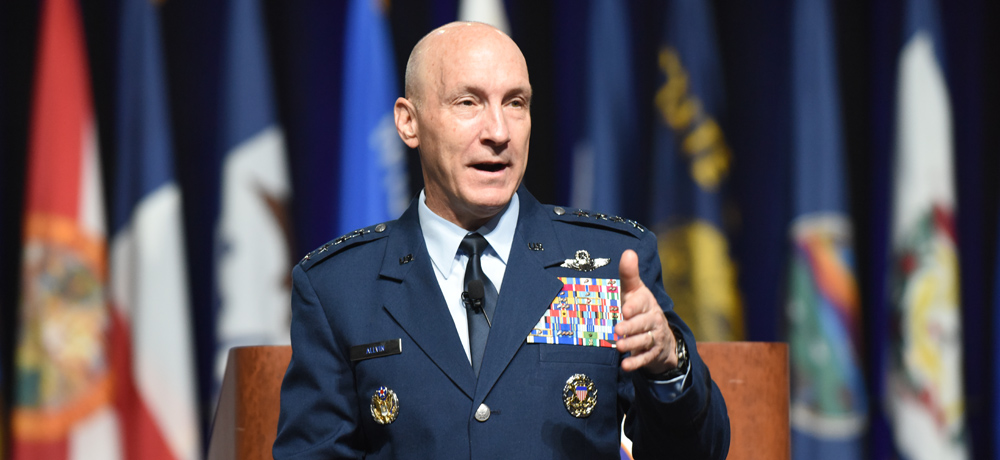
Our actions or inactions will ripple into the future.
—Gen. David W. Allvin, the Air Force chief of staff
THE PRIMARY PURPOSE OF THE CONFERENCE has long been to gather NGAUS members from every state and territory and set the association’s legislative agenda for the upcoming year.
In Detroit, conference delegates adopted 78 legislative resolutions (35 Joint, 21 Army and 22 Air). The resolutions will serve as the basis of the NGAUS action plan next year when Congress takes up fiscal 2026 defense legislation. Representatives from all 54 states, territories and the District of Columbia developed the resolutions package during meetings at the coference.
Conference delegates also adopted two changes to the association bylaws. Resolutions adopted by the NGAUS conference are now effective for three years but may be extended for one-year increments. Resolutions had been effective only through the next year’s conference.
The other change affects corporate members. The NGAUS board will now decide annual dues for the various corporate membership levels. Corporate member dues were previously stipulated in the bylaws with any changes subject to the consent of conference delegates.
Conference delegates also selected a new chairman during the annual board elections. Maj. Gen. Paul D. Rogers, the adjutant general of Michigan, now heads the 29-member NGAUS governing body. He previously served as the board’s Area V TAG rep.
Rogers succeeds Maj. Gen. Janson “Durr” Boyles of Mississippi. Boyles is now the association’s immediate past chairman. The association bylaws limit the NGAUS chairman to one term.
A complete listing of the association board is available on page 2. The new board’s first meeting is set for Nov. 16 at the National Guard Memorial, the NGAUS headquarters in Washington, D.C.
The authors can be reached at magazine@ngaus.org.
146TH GENERAL CONFERENCE & EXHIBITION
BY THE NUMBERS
4,424 Registered attendees
7 State Partnership Program nations represented
593 Company-grade officers
330 Exhibitors
240 Active or retired general officers
32 Main session speakers & presenters
1,130 Voting delegates
2,608 AFBA NGAUS Conference App downloads
54 Individual awards presented
78 Legislative resolutions adopted
85 Press passes issued to cover speech by former President Donald Trump
2025 CONFERENCE SET FOR FAMILIAR LOCATION
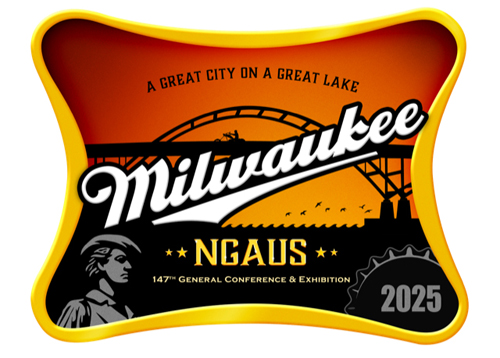
The NGAUS conference next year will return to the Great Lakes region. The association’s annual gathering is headed to Milwaukee, a destination Vogue magazine calls “the Midwest’s coolest and most underrated city.”
The 147th General Conference & Exhibition is scheduled for Aug. 22-25, 2025.
Located on the shores of Lake Michigan just 90 miles north of Chicago, “Milwaukee,” Vogue said, “is a Midwestern city that feels like a coastal one, where sailboards bob in the harbor and golden beaches stretch along a shockingly blue shore.”
It’s also a city with great architecture, a thriving arts scene and a vibrant nightlife that includes 150 restaurants downtown plus pubs, bars and, of course, beer gardens. After all, the city is one of the beer capitals of the world.
Most conference meetings and the industry exhibition will be in the recently expanded and refurbished Baird Center. The facility was also the hub when Milwaukee hosted the event in 1998 and 2011.
But the Wisconsin National Guard Association is planning several events beyond the Baird Center. On Friday, Aug. 22, attendees will be able to choose among golf, a Harley Davidson motorcycle ride or sport fishing from a charter boat on Lake Michigan.
The always popular mixers are set for that evening at the Deer District, a downtown indoor-outdoor sports, retail and entertainment destination. The all-attendee Governor’s Reception is scheduled for Discovery World, a large interactive science and technology museum.
Most attendees will reach the city via Milwaukee Mitchell International Airport, which is eight miles from downtown. The city is also just a six-hour drive from eight states.
WINGA has secured rooms in 16 downtown hotels. Specific state and territory hotel assignments will be announced after the National Guard Executive Directors Association Meeting in January.
More granular conference details will be posted on the NGAUS website as they become available.
— NGAUS staff report


